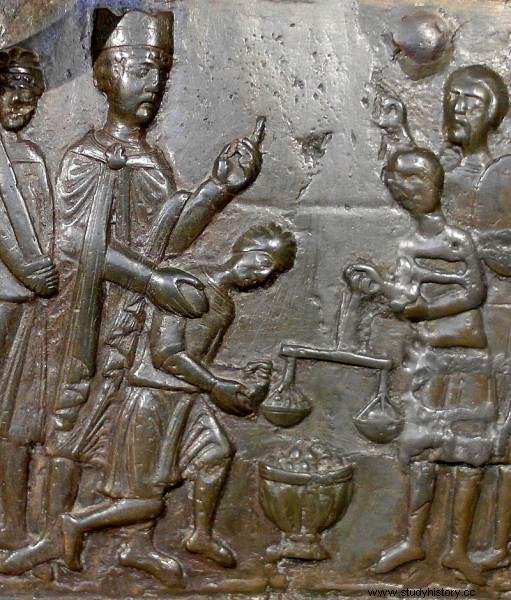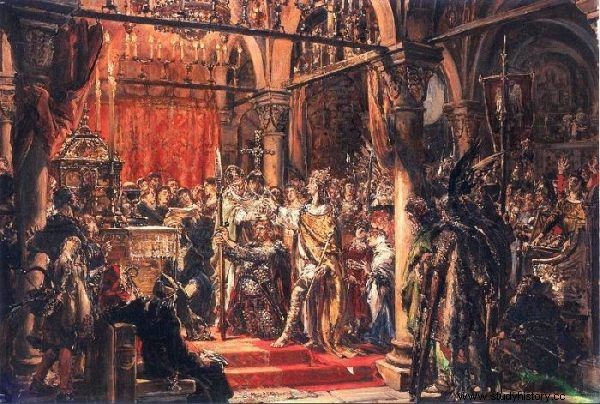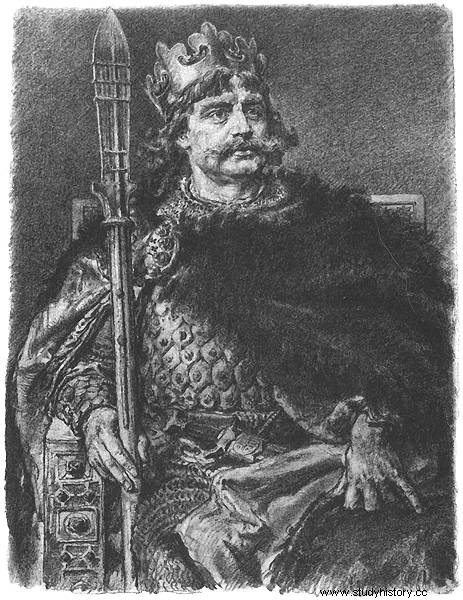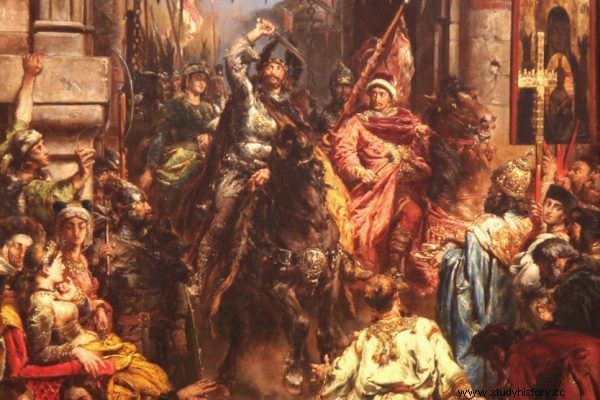The son of Mieszko I and the first king of Poland, he was undoubtedly an outstanding ruler, a great conqueror, a great tactician and strategist, and a skillful politician. During his time, the young Piast state dealt cards in our part of the world. Chrobry was also a zealous promoter of the new faith. According to chroniclers, he introduced Christian morality after goodness and under duress. At the same time, however, he himself was not a model of Christian virtue. He had several wives whom he treated instrumentally. The chronicles also show that he committed a rape, which he did not hide at all. He raped the Russian princess Przedsława, then abducted her and made her his concubine ...
If the chronicle records are to be believed, lusters and those who cheated on their spouses had an exceptionally hard life in the early Polish state. If the case came to light, the only hail Mary was not enough for penance…
His people (ed .:Chrobry) require that they be guarded like cattle and whip like a stubborn ass; also, it is impossible to govern himself in the interests of the ruler, if he does not apply severe punishments. If any of these people dares to seduce someone else's wife or to engage in debauchery, he is immediately punished by the following punishment:he is led to the market bridge and tied to it by hammering a nail through the scrotum with testicles. Then a sharp knife is placed next to him, and he is given a difficult choice:either die there or cut off that part of the body. If it was stated that someone ate meat in seventeen, he was severely punished by breaking his teeth.
The German chronicler Thietmar mentions the draconian punishments used in the state of Brave for moral offenses. The description is frightening from today's perspective, but is it plausible? Certainly, Thietmar did not like both the Slavs and the Brave himself. If we were to use today's phraseology, we could successfully call Thietmar the first representative of "anti-Polishism".

Bolesław I the Brave buys the body of Saint Adalbert from the hands of the Prussians, fragment of the Gniezno Doors around 1170
His biased image of the Piast state as a wild country, just torn from the depths of paganism, had propaganda justification. Thietmar himself was not only a chronicler, but also a bishop - he acted in the interests of Germany and the local church hierarchy. While Mieszko I was described gently, in the case of Brave who fought victorious battles with the empire, the chronicler's reluctance is extremely evident.
Does all of this mean that Thietmar's account is untrue? Certainly, one should take into account the chronicler's bias, which, however, does not change the fact that, although he was zealous in introducing a new faith, he himself was not the best example of it ...
A saint worth his weight in gold
The first king of Poland knew how to present himself as a god-fearing ruler and an ardent Christian. He knew it would be worth it. When the Prussians murdered St. Adalbert, who tried to bring them the good news about the Savior, Bolesław bought his body from the pagans. He allegedly paid as much gold as the saint's body weighed.
Was it really so? Today, the report on this form of buyout is being questioned, at least the transaction has paid off for Brave - both in terms of image and politics.
In 1000, with a pilgrimage to the relic of St. Wojciech, Otto III himself, a young German emperor, came to Gniezno. Here he made a solemn alliance with Bolesław. There were also symbolic gestures, such as the imposition of the imperial diadem on the head of the Polish ruler, but a much effect of the visit was the creation of the Gniezno metropolis - the first ecclesiastical metropolis in Poland, subordinate only to the Pope, headed by the brother of St. Wojciech - Radzim Gaudenty.
Building church institutions in the new Christian state that would not fall under the German hierarchy was a great success for Brave and his country. So in the end, the weight of gold for the body of the holy Piast ruler simply paid off.
Merciful Boleslaus
There were also other activities of Bolesław, which proved that he was familiar not only with the warrior and invasions on his neighbors, but also with Christian ethics and mercy. When in 1003 robbers for silver valuables murdered the so-called Five Martyr Brothers, i.e. four monks (two Italians and two Polish novices) and their servant, whom Chrobry brought to the first missionary order in Poland, the Polish ruler instead of - as standard in those times - condemning them to at least cruel mutilation (e.g. blindness) and most likely to death, he spared the thieves' lives.
Ordered the killers ... to work in a monastery. They were to minister to the monks who came to replace the dead.
By the standards of the time, he was very gentle. Why did he behave this way?

Brave's greatest achievement was obtaining the royal crown
Perhaps he actually took to heart Christ's words to forgive his neighbor. We know, however, that towards the other guilty, he did not have that much grace. For example:when the people of Prague asked him for help and throw the tyrant Bolesław III the Red from the throne, who ruled in Prague extremely cruelly, Chrobry obeyed the voice of a neighboring nation. Rudy invited him to Krakow - for political and friendly talks. The latter, not expecting anything, accepted the invitation. When he arrived, Brave's soldiers captured him. Then he was blinded. According to historians, a blind man dressed in princely robes wandered for years in the city of Kraków. It was probably the mutilated Bolesław the Red.
So where does the ruler who could deal so cruelly with his opponents come from grace towards the thugs? Was Chrobry really filled with the spirit of evangelical forgiveness?
Rather, it can be assumed that, as in the case of the body of St. Wojciech, he was not guided by religious considerations, which - as we would call it today - Piarist ....
In punishing criminals in such a gentle manner, the Polish ruler referred to the patterns developed in the West in the times of Charlemagne. Indeed then, the criminal who killed the monk instead of death was to minister and do penance himself in the monastery.
Thus, when applying such a mild punishment, Bolesław appeared as a ruler of the light, familiar with trends, applying the highest standards, etc. Certainly, such a move made it difficult for slanderers to make him a savage and a pagan who only dressed in feathers straight from the "civilized" world.
Wives to be exchanged
In reality, however, apart from politics and show gestures, the life of Bolesław the Brave had little to do with Christian moderation and clean morals. The Piast ruler "earned" four wives. The first - the unknown daughter of the margrave of Meissen, Rygdag - he sent back to his mother-in-law shortly after the wedding. Was he bored of him? We will never find out, but in those days a man in position could easily get rid of his spouse. If she did not give him an offspring on time, she was considered sterile and sent back empty-handed.
A few years later, Bolesław remarried - with a Hungarian princess, whose name we do not know. She gave him a son - Bezpryma - and yet she was also dismissed, which may already be surprising. She finally gave birth to her firstborn.
The real love of Bolesław's life was probably only the third wife of Chrobry - Emnilda, the daughter of the Slavic prince Dobromir (probably from Moravia). It was with her that he spent 28 years. They married in 989. Emnilda was about 17 years old, Bolesław 22. This union lasted until Emnilda's death. She gave birth to two sons to Brave, including the elder Mieszko, whom he valued the most and put on the throne , depriving the succession of the firstborn Bezprym.

We associate Bolesław the Brave mainly with the territorial expansion of the state and successes in the field of domestic politics.
After Emnilda's death, the elderly, over 50-year-old ruler remarried, although in this case there was no question of any feeling. He made the usual political transaction. After years of fierce war with the German empire, which was victorious for Chrobry, the Piast state made peace with Germany in Budziszyn. Miśnia, Milsko and Łużyce remained with Poland, and the seal of this state of affairs was the marriage of Bolesław with the teenage Oda - the daughter of margrave Miśnia.
The girl was no more than 20 years old and it was almost immediately clear that she could not count on real respect, worthy of the prince's wife. It is true that she gave Chrobry a daughter, Matilda, but this did not strengthen her position. This one was struck almost immediately after the wedding. The newlyweds not only raped another woman and made her a concubine, but he did not hide it at all. On the contrary, he boasted about his "feat".
"The old harlot"
We are talking about the Ruthenian princess - Przedsławie. A year before the invasion of Ruthenia, before he married Oda, Chrobry tried to marry her, but was rejected, which he perceived as an insult. What's more - the Russian ruler Jarosław Mądry imprisoned the daughter of Brave, and the wife of his brother Świętopełk, who previously ruled in Kiev. After Jarosław was deposed from the throne, Świętopełek escaped to Poland seeking Bolesław's help.
After dealing with the Germans, Chrobry decided to regain his influence in the east and re-establish Świętopełk on the Kiev throne. When he set off against Rus in the summer of 1018, announced to his warriors that he would have the sister of Jarosław the Wise - Przedsława - even by force . And he kept his word.
After the breakthrough of the Ruthenians on the Bug river, the road to Kiev became open to Polish warriors. Two weeks later, the Piast ruler entered the heart of Kievan Rus, one of the richest cities in Europe at that time. Jarosław the Wise, upon the news of the approach of Brave's warriors, fled the town shortly earlier, leaving the Pre-Slava for the Polish ruler.

Bolesław Chrobry invaded Kyiv, raped and kidnapped Przedsława
What happened next? According to Gallus Anonymus, Bolesław, entering Kiev, chipped his sword on the famous Kiev's Golden Gate. It was then that he announced publicly what he would do with the Russian princess. He stated that he would… rape her.
As at that hour the Golden Gate of the city was struck by this sword, the next night the sister of the most cowardly king, whom he did not want to give me, will succumb. However, she will not join Bolesław in the marriage bed, but only once, like a concubine, so that the insult of our family, the Ruthenians, will be avenged in this way, to insult and shame.
After raping Przedsław Chrobry, he probably took her to Gniezno, along with rich loot and thousands of slaves. Bolesław wanted to replace the princess with his daughter and wife, Świętopełk, who was held in captivity, Jarosław, but the prince, expelled from Kiev, did not agree. As a result, Rusinka ended up in Gniezno, where she probably - despite the fact that Chrobry had a wife - became his concubine. The chronicler Thietmar mentions the abduction of Przedsław:
There were also present:the prince's stepmother, his wife and nine of his sisters, one of whom, previously chosen, was taken by this old harlot Bolesław shamelessly, forgetting about his wedding wife.
The history suggests, therefore, that in captivity, the Ruthenian princess had to perform sexual services for the Brave. All this happened with the knowledge of his young wife Oda, who was probably pregnant with Bolesław at the time of her return from Rus. However, her growing belly did not protect her from contempt and disrespect.
Did Chrobry's wife and concubine live with him in the same court, or did he settle Przedsława in one of the castles and visit her from time to time? Perhaps, but this is only speculation. We know nothing about the fate of both Przedsław and Oda. What is certain is that they were only toys in the hands of the Piast ruler, who at the same time spoke of a zealous Christian.
Bibliography:
- Balzer O. M .:Genealogy of the Piasts. Published by Academy of Skills, 1895. OCLC 26843991.
- Labuda G .:Studies on the beginnings of the Polish state. Poznań:Scientific Publishers of the University of Adam Mickiewicz, 1988,
- Grabski A.F., Bolesław Chrobry, Warsaw 1964
- Jasienica P., Poland Piastów, Warsaw 1998
- Jasiński K. Pedigree of the first Piasts. Warsaw-Wrocław:Volumen, University of Wrocław, 1992.
- Łowmiański H:The beginnings of Poland:from the history of the Slavs in the first millennium CE Warsaw:Państwowe Wydawnictwo Naukowe, 1973.
- Pleszczyński A., Wars with the Empire and the coronation, (in :) At the sources of Poland, ed. M. Derwich, Warsaw - Wrocław 2002
- Zakrzewski S., Bolesław the Brave, Krakow 2006
Historical:
- Gall Anonim, Polish Chronicle, ed. M. Plezia, Wrocław 2003
- Nestor, The Tale of Bygone Years, ed. F. Sielicki, Wrocław 1999
- Thietmar of Merseburg, Chronicle, ed. M. Z. Jedlicki, Poznań 1953
